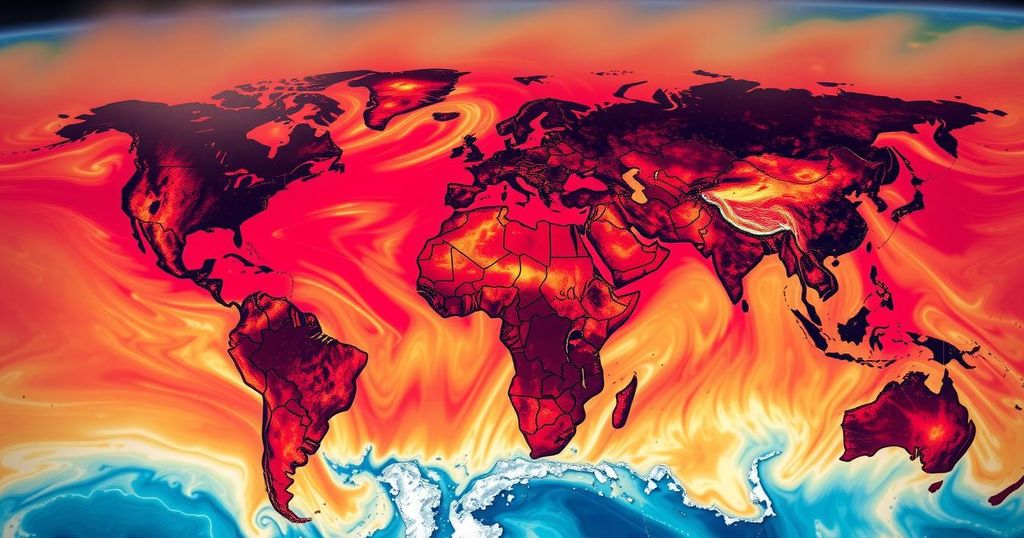In 2024, the world recorded its hottest year ever, with temperatures reaching 1.46°C (2.6°F) above pre-industrial levels. This event highlights a severe climate crisis, with impacts being felt globally, particularly in regions such as the Arctic. Experts emphasize the urgent need for immediate climate action and underscore the escalating rate of global warming, necessitating strong intervention from governments to prevent catastrophic outcomes.
In 2024, the world experienced the hottest year on record for both land and oceans, as confirmed by scientists from the United States government. The National Oceanic and Atmospheric Administration (NOAA) reported that the global average temperature was 1.46°C (2.6°F) above pre-industrial levels, marking a significant rise compared to previous records. This temperature increase is particularly striking as it has surpassed previous highs, with all of the ten hottest years recorded since 1850 occurring within the last decade.
According to NASA’s temperature data, 2024 was noted as being 1.47°C (2.6°F) warmer than pre-industrial times, reinforcing the consensus among climate scientists regarding the unprecedented nature of this warming. Gavin Schmidt, a senior climate scientist at NASA, remarked, “All the groups agree, regardless of how they put the data together, there’s no question. The long-term trends are very clear.” The implications of such temperature rises point towards an accelerated trajectory of climate change that is pushing global temperatures to levels unseen in human history.
In 2024, the impacts of climate change were felt acutely, with record temperatures affecting regions including the United States, Europe, and Africa, as well as the Arctic, which is warming at a rate three times higher than the global average. Severe weather events such as unprecedented heat in Mexico and devastating floods in Spain illustrated the extreme conditions traversing various continents. The oceans, which absorb much of the heat from human activities, also recorded an alarming increase in temperature, further exacerbating climate impacts.
Despite the rise attributed to natural phenomena such as El Niño, experts assert that the accelerating rate of global warming has caused scientists to seek additional explanations for the unprecedented heat. Robert Rohde, lead scientist at Berkeley Earth, commented on the urgency of the current climate crisis, noting that the recent records suggest a trend of faster-than-expected global warming. While a single year exceeding the 1.5°C threshold does not invalidate the Paris Agreement, the long-term outlook remains grim, as countries continue to struggle with fulfilling their emissions reduction commitments.
Antonio Guterres, Secretary-General of the United Nations, stressed the necessity for immediate climate action, stating, “Blazing temperatures in 2024 require trail-blazing climate action in 2025. There’s still time to avoid the worst of climate catastrophe. But leaders must act – now.” It is clear that the persistence of inaction among governments could lead to catastrophic climate repercussions.
The confirmation that 2024 was the hottest year on record highlights the ongoing climate crisis that has severe repercussions for humanity and the environment. With global temperatures rising beyond previous historical experiences, it is crucial to understand the factors contributing to this warming. Notably, since the industrial era, human activities, particularly the burning of fossil fuels, have resulted in unprecedented increases in atmospheric temperatures, leading to drastic changes in climate patterns worldwide. This current trajectory poses significant risks to ecosystems and human health, necessitating urgent actions to mitigate the crisis.
The confirmation of 2024 as the hottest year on record underscores the immediate threats posed by climate change, illustrating the urgent need for comprehensive and decisive action. The data reveal a stark reality wherein the global average temperature continues to rise, exacerbated by human activities and insufficient governmental responses. Not only do these trends call for immediate attention, but they also compel world leaders to take responsibility in combating climate impacts to safeguard the planet for future generations.
Original Source: www.theguardian.com






